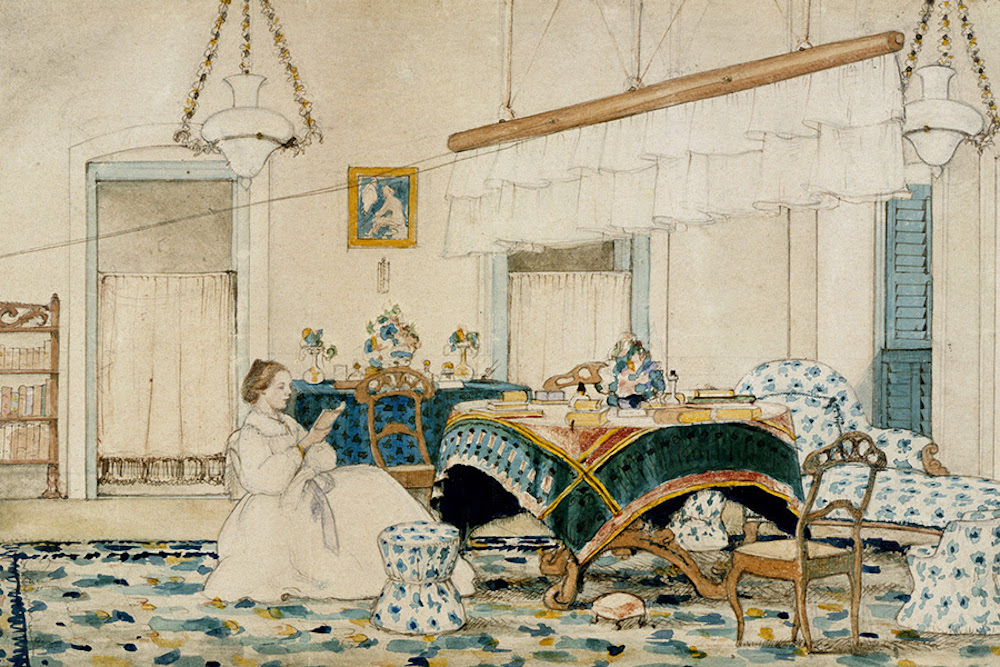In March, The Paris Review launched The Art of Distance, a newsletter highlighting unlocked archive pieces that resonate with the staff of the magazine, quarantine-appropriate writing on the Daily, resources from our peer organizations, and more. Read Emily Nemens’s introductory letter here, and find the latest unlocked archive selection below.
“In his Art of Poetry interview, Henri Cole said: ‘I think it would be rather narrow—and moralistic—to say that poetry must comfort us and point to what is good. I don’t think that is the function of art, though sometimes it is a happy result.’ The Paris Review has never aspired to narrowness, or moralism, in its acquisitions—we publish literature, and embrace the wide-open range of emotions that capital-A Art can evoke. But sometimes, in some weeks, we could use a few ‘happy results,’ whether by happenstance or otherwise. Below, we’ve assembled the literary equivalent of comfort food, poems and stories that bring us some solace time and again—for their artfulness, for their assured craft, for their steady (or strange) hand and kind touch. May they offer some gladdening to you, too.” —EN
This week, I’ve found comfort in cheese puffs and Robert Walser, whose “Snowdrops” (translated by Tom Whalen and Trudi Anderegg) seems to predict both the changing seasons and the bright future a winter might bring: “Little snowdrops, of what do you speak? They speak still of winter, but also already of spring; they speak of the past, but also saucily and merrily of the new.” —EN
“Birthmark” was one of the first Miranda July stories I ever read, at which point I immediately decided that the world of her fiction is one I’d like to live in. Yes, her characters are sad and strange, always clumsily grasping for semblances of connection, but we have all that here, too. Something about July’s world feels comfortingly familiar, yet there, pain is something that can be scaled from one to ten and “you know that winning is many things, but it is never the thing you thought it would be.” In this way, “Birthmark” has a happy ending, but first comes an inexplicable change, a sudden transformation—maybe a loss, but one that opens the door for a real, full life. —Langa Chinyoka, intern
“Sweets, nuts, sodden chocolates, nut-cakes, mints.” This brief menu from Derek Walcott’s lush poem “The Light of the World” feels as decadent as the careless joy that the narrator feels on a bus ride through Saint Lucia, with “no need for time.” Like sodden chocolates, the suspended moment rendered here is rich and intoxicating. —Lauren Kane, assistant editor
Reading Alice Munro’s work gives me the feeling of following someone who knows what she is doing, someone who is always on sure footing even as she executes flawless triple axels of storytelling like “Circle of Prayer” and “Spaceships Have Landed.” As when watching an athlete stick the landing, you might take a nice deep breath when you read these stories—maybe without even using an app! —Jane Breakell, institutional giving officer
Out of all the things I’ve been longing for throughout these past few months, theater is certainly in the top three. On top of that, I’m a sucker for musicals: the spectacle, the music, the electric sensation that assimilates every performer, techie, and audience member into a collective emotional sea. Luckily—along with all the plays The Paris Review has published in the past—I’ve been able to turn to Stephen Sondheim’s Art of the Musical interview in order to imagine returning to the theatrical magic that I know would lift my spirits terribly. —Carlos Zayas-Pons, intern
There’s an Adrienne Rich poem, “The Burning of Paper instead of Children,” from her 1971 collection The Will to Change, that I have returned to so many times since I first encountered it as a teenager that its rhythms feel as though they have always been within my body, that I was born reciting lines from it. The Paris Review didn’t publish that work, but the Winter–Spring 1962 issue has another Rich poem that I find myself returning to again and again, “End of an Era.” It’s a relatively early work, but there are lines that ring in my ears every time I read them: “Stale as a written-out journalist, / I start to sort my gear. / Nothing is happening … poetry / extends its unsought amnesty, / autumn saws the great grove down.” —Rhian Sasseen, engagement editor
Sign up here to receive a fresh installment of The Art of Distance in your inbox every Monday.
from The Paris Review https://ift.tt/32tCyCg

Comments
Post a Comment